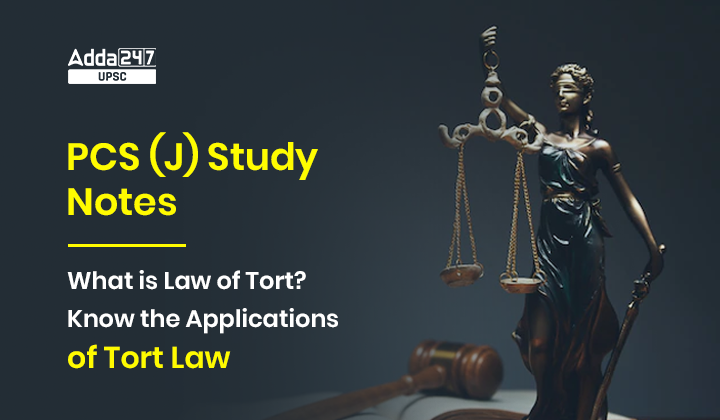Table of Contents
What is Law of Tort? Know the Applications of Tort Law
Meaning of Tort in Law
In civil law, a tort is a wrong committed against a private party. Tort comes from the Latin word tortum, which means “twisted” or “crooked.” It has the same meaning as the English word “wrong” in this context. There are two main branches of law: civil law and criminal law. Tort law and contract law are subsets of civil law.
Tort Law
A tort is any intentional wrongdoing that results in injury to another person. This wrongdoing results in some kind of harm or injury to the victim. When we say “injury,” what we really mean is “violation of a person’s legal right,” and when we say “harm,” we mean “any loss or detriment to a person that leads to his suffering.” Law of Tort is not codified and does not originate from statutes.
Tort Law in India
The Law of Tort system in India has derived heavily from its counterpart in the United Kingdom. Judge-made legislation is the term used to describe this phenomenon. As in other common law jurisdictions, the law of tort in India is primarily governed by judicial precedent, with statutory provisions supplementing this in areas such as damages, civil procedure, and the codification of common law torts. The necessity of India’s law of tort is a topic of much debate. In numerous cases, Indian courts have ruled that the country’s law of tort is crucial to the progress of Indian society.
As a body of law, law of torts in India addresses and provides redress for civil wrongdoings that fall outside of the purview of contracts. Law of torts provides a mechanism for victims of wrongdoing to seek redress from those who are deemed liable under the law. However, codifying statutes, such as those governing damages, have helped to modernise India’s tort law. Although India generally adopts the British method, there are some notable exceptions that raise concerns about judicial activism.
Function of Law of Tort
When someone is injured, the primary goal of the Law of Torts is to compensate them for their losses. The goal now is to share the losses among people who are connected in some way.
The violation of a general duty is at the heart of both criminal and tortious behaviour. Murder, robbery, burglary, etc., are all crimes that are under the state’s strict control. When it comes to the Law of Torts, the state also controls all of the most common wrongs. People often assume that if one person is harmed, then society as a whole is affected.
As a result, the Law of Torts primary goal is retribution for the victim and the prevention of further harm to others.

अपकृत्य का कानून क्या है? अपकृत्य कानून के अनुप्रयोगों को जानें
कानून में अपकृत्य का अर्थ
अपकृत्य सिविल गलत है, यानी यह किसी व्यक्ति के खिलाफ गलत है। अपकृत्य शब्द लैटिन शब्द ‘टोर्टम’ से लिया गया है जिसका अर्थ है कुटिल या मुड़ा हुआ। इस अर्थ में, यह अंग्रेजी शब्द ‘गलत’ के बराबर है। कानून दो में विभाजित है – नागरिक और आपराधिक। नागरिक कानून को आगे दो में विभाजित किया गया है – अपकृत्य और अनुबंध।
अपकृत्य कानून
सरल शब्दों में, अपकृत्य को एक व्यक्ति द्वारा दूसरे व्यक्ति के प्रति किए गए कार्य के रूप में परिभाषित किया जा सकता है जो दूसरे व्यक्ति को नुकसान पहुंचाता है। गलत काम करने का यह कार्य या तो दूसरे व्यक्ति को चोट पहुँचाता है या नुकसान पहुँचाता है। चोट से हमारा मतलब है – किसी व्यक्ति के कानूनी अधिकार पर आक्रमण और नुकसान से इसका मतलब है – किसी व्यक्ति को किसी भी नुकसान या हानि का कारण जो उसकी पीड़ा का कारण बनता है। अपकृत्य कानून का कानून किसी क़ानून से नहीं आया है और इसे संहिताबद्ध नहीं किया गया है।
भारत में अपकृत्य कानून
भारत में अपकृत्य का कानून यूके में अपकृत्य के कानून से विकसित और विकसित हुआ है। सबसे लोकप्रिय “जज मेड लॉ” के रूप में जाना जाता है। भारत में अपकृत्य का कानून मुख्य रूप से अन्य सामान्य कानून न्यायालयों के रूप में न्यायिक मिसाल द्वारा शासित होता है, जो नुकसान, नागरिक प्रक्रिया को नियंत्रित करने वाले कानूनों और सामान्य कानून के उल्लंघन को संहिताबद्ध करता है। अक्सर इस बात पर चर्चा होती रही है कि भारत में अपकृत्य का कानून जरूरी है या नहीं। भारत में अदालतों ने अक्सर यह स्टैंड लिया है कि अपकृत्य का कानून भारत में आवश्यक है और समाज की वृद्धि और विकास के लिए अनुकूल है।
भारत में अपकृत्य का कानून कानून का एक निकाय है जो नागरिक गलत कामों के गैर-संविदात्मक कृत्यों को संबोधित करता है और उपचार प्रदान करता है। कानूनी क्षति से पीड़ित व्यक्ति कानूनी रूप से जिम्मेदार या उत्तरदायी व्यक्ति से उन चोटों के लिए मुआवजा प्राप्त करने के लिए अपकृत्य कानून का उपयोग करने में सक्षम हो सकता है। भारत में टॉर्ट्स का कानून एक अपेक्षाकृत नया आम कानून विकास है, जो नुकसान को नियंत्रित करने वाले कानूनों सहित संहिताबद्ध विधियों द्वारा पूरक है। जबकि भारत आम तौर पर यूके के दृष्टिकोण का पालन करता है, कुछ मतभेद हैं जो न्यायिक सक्रियता का संकेत दे सकते हैं, इसलिए विवाद पैदा कर सकते हैं।
टॉर्ट के कानून का कार्य
अपकृत्य कानून का मुख्य उद्देश्य चोट लगने वाले व्यक्ति को मुआवजा प्रदान करना है। हालांकि आधुनिक समय में इसका उद्देश्य उन लोगों के बीच नुकसान को बांटना है जो एक तरह से एक दूसरे से जुड़े हुए हैं।
अपराध और अपकृत्य दोनों में सामान्य तत्व सामान्य कर्तव्य का उल्लंघन है। राज्य हत्या, डकैती, सेंधमारी आदि जैसे गंभीर अपराधों को नियंत्रित करता है। अपकृत्य के कानून में भी, सभी सामान्य दोषों पर राज्य का नियंत्रण होता है। ऐसा माना जाता है कि किसी व्यक्ति को नुकसान समाज के बराबर है।
इस प्रकार, अपराध के कानून का मुख्य उद्देश्य गलत करने वाले को दंडित करना और समाज में शांति को बढ़ावा देना है।
FAQs
1. From where has the law of Tort developed and evolved in India?
Ans: UK
2. What is the main function of Law of Tort?
Ans: The main function of Law of Torts is to provide compensation to the person who has suffered injuries.




 TSPSC Group 1 Question Paper 2024, Downl...
TSPSC Group 1 Question Paper 2024, Downl...
 TSPSC Group 1 Answer key 2024 Out, Downl...
TSPSC Group 1 Answer key 2024 Out, Downl...
 UPSC Prelims 2024 Question Paper, Downlo...
UPSC Prelims 2024 Question Paper, Downlo...






